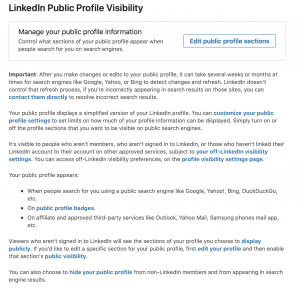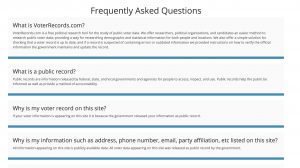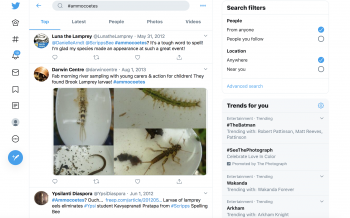Difference between revisions of "Ian Mascarenhas"
| Line 5: | Line 5: | ||
==<b>Social Media </b> == | ==<b>Social Media </b> == | ||
| − | The first category, pages that I have control over, are my social media pages. These pages are the only social media accounts that I have: Linkedin, Facebook, and Instagram. My Linkedin is the very first result when I search my name. I have control over all information that shows up on my Linkedin, and I don’t have an issue with my profile being very visible to the public. Unlike most social media, Linkedin gives the feature to limit profile visibility. According to the Linkedin [[File:Linkednimg.png|thumbnail|right|Linkedin's Privacy Policy]] help page, “Viewers who aren't signed in to LinkedIn will see the sections of your profile you choose to display publicly. If you'd like to edit a specific section for your public profile, first edit your profile and then enable that section's public visibility. You can also choose to hide your public profile from non-LinkedIn members and from appearing in search engine results.” They also make it known to their users that “after you make changes or edits to your public profile, it can take several weeks or months at times for search engines like Google, Yahoo, or Bing to detect changes and refresh. LinkedIn doesn’t control that refresh process, if you’re incorrectly appearing in search results on those sites, you can contact them directly to resolve incorrect search results.” The next social media page is Facebook, which is also on the first page of results. I also control all information on my Facebook page. In addition, Facebook limits the amount of information that a person can see on someone else’s profile without being signed into their own account. Unlike Linkedin, Facebook doesn’t give the option to limit certain parts of your profile to the public. At the same time, I’m able to give as much or as little information as I please. The last social media account that I have is Instagram. Since my full name is in the profile, my Instagram page showed up during the search. My Instagram account is private, so people can only see my profile picture and biography, unless they request to follow me. With all social media, I have full control over how much information appears on my profile. At any time, I can choose to deactivate any of these accounts and they will no longer show up in search results. | + | The first category, pages that I have control over, are my social media pages. These pages are the only social media accounts that I have: Linkedin, Facebook, and Instagram. My Linkedin is the very first result when I search my name. I have control over all information that shows up on my Linkedin, and I don’t have an issue with my profile being very visible to the public. Unlike most social media, Linkedin gives the feature to limit profile visibility. According to the Linkedin |
| + | [[File:Linkednimg.png|thumbnail|right|Linkedin's Privacy Policy]] | ||
| + | help page, “Viewers who aren't signed in to LinkedIn will see the sections of your profile you choose to display publicly. If you'd like to edit a specific section for your public profile, first edit your profile and then enable that section's public visibility. You can also choose to hide your public profile from non-LinkedIn members and from appearing in search engine results.” They also make it known to their users that “after you make changes or edits to your public profile, it can take several weeks or months at times for search engines like Google, Yahoo, or Bing to detect changes and refresh. LinkedIn doesn’t control that refresh process, if you’re incorrectly appearing in search results on those sites, you can contact them directly to resolve incorrect search results.” The next social media page is Facebook, which is also on the first page of results. I also control all information on my Facebook page. In addition, Facebook limits the amount of information that a person can see on someone else’s profile without being signed into their own account. Unlike Linkedin, Facebook doesn’t give the option to limit certain parts of your profile to the public. At the same time, I’m able to give as much or as little information as I please. The last social media account that I have is Instagram. Since my full name is in the profile, my Instagram page showed up during the search. My Instagram account is private, so people can only see my profile picture and biography, unless they request to follow me. With all social media, I have full control over how much information appears on my profile. At any time, I can choose to deactivate any of these accounts and they will no longer show up in search results. | ||
===Search Query: 'Kavyapranati Pratapa' === | ===Search Query: 'Kavyapranati Pratapa' === | ||
| − | On the other hand, when I googled[[File: | + | On the other hand, when I googled |
| + | [[File:Voterrecords.png|thumbnail|asdf]] | ||
| + | my given birth name <b>‘Kavyapranati Pratapa’,</b> I was able to find almost <b>5 pages of content</b> that all had relevance to me! The top two search results were my Linkedin and WayUp profiles, but I also saw many more local newspaper articles about me from my spelling bee days within the first two pages. As I moved through the search results, I even found random blogs and discussion threads about the National Spelling Bee competitions that contained my name, with one user commenting how <em>"with a name like Kavyapranati Pratapa, they can spell anything"</em>. What was most surprising, however, was finding a <b>hashtag on Twitter</b> of the very word that I misspelled in the 2012 National Spelling Bee! | ||
<br style = "margin-top:5px;">Apart from [[File:Screen Shot 2020-02-13 at 8.34.52 PM.png|350px|thumbnail|left|My very own Twitter Hashtag]]'spelling bee' related results, there were a couple pages that contained my name from other activities, such as my vocal performances, my Medium blog that I don't post on anymore, the university's Honors Convocation last year, and even under another data broker service <b>FastPeopleSearch.com</b>. It was pretty shocking to see how many different sources of information contained my name. There was just too much out there. | <br style = "margin-top:5px;">Apart from [[File:Screen Shot 2020-02-13 at 8.34.52 PM.png|350px|thumbnail|left|My very own Twitter Hashtag]]'spelling bee' related results, there were a couple pages that contained my name from other activities, such as my vocal performances, my Medium blog that I don't post on anymore, the university's Honors Convocation last year, and even under another data broker service <b>FastPeopleSearch.com</b>. It was pretty shocking to see how many different sources of information contained my name. There was just too much out there. | ||
Revision as of 16:03, 19 February 2021
We’ve all probably Googled ourselves before. In the age of the Internet, everyone seems to have some sort of online presence. Whether it’s intentional or not, we all have created this presence simply by interacting with online artifacts such as social media. In the past ten years, data has become a very important component of the internet. Some even refer to it as the new oil. As a result, our data isn’t just out there for the purpose of Googling ourselves and having a laugh, but also so companies and other interested parties can access it and treat it like a commodity.
Contents
Introduction
I tried multiple different methods of searching. I used three different browsers: Safari, Google Chrome, and Firefox. I also used incognito mode in all those browsers, but results were still consistent. Since my name is relatively unique, I first just searched it without modifications as “Ian Mascarenhas.” One problem I came across was that results were coming up specifically for my last name. To try and narrow my search further, I searched “Ian Mascarenhas Michigan” and “Ian Mascarenhas University of Michigan.” Both of these searches returned more specific results. Generally as I went through search results, I noticed that the queries fell in one of three categories. The first one are pages that I have created and control: my social media accounts. The second results are pages that I know exist, but I don’t have control over information on them. The last category are pages that have information on me without my knowledge or permission.
Social Media
The first category, pages that I have control over, are my social media pages. These pages are the only social media accounts that I have: Linkedin, Facebook, and Instagram. My Linkedin is the very first result when I search my name. I have control over all information that shows up on my Linkedin, and I don’t have an issue with my profile being very visible to the public. Unlike most social media, Linkedin gives the feature to limit profile visibility. According to the Linkedin
help page, “Viewers who aren't signed in to LinkedIn will see the sections of your profile you choose to display publicly. If you'd like to edit a specific section for your public profile, first edit your profile and then enable that section's public visibility. You can also choose to hide your public profile from non-LinkedIn members and from appearing in search engine results.” They also make it known to their users that “after you make changes or edits to your public profile, it can take several weeks or months at times for search engines like Google, Yahoo, or Bing to detect changes and refresh. LinkedIn doesn’t control that refresh process, if you’re incorrectly appearing in search results on those sites, you can contact them directly to resolve incorrect search results.” The next social media page is Facebook, which is also on the first page of results. I also control all information on my Facebook page. In addition, Facebook limits the amount of information that a person can see on someone else’s profile without being signed into their own account. Unlike Linkedin, Facebook doesn’t give the option to limit certain parts of your profile to the public. At the same time, I’m able to give as much or as little information as I please. The last social media account that I have is Instagram. Since my full name is in the profile, my Instagram page showed up during the search. My Instagram account is private, so people can only see my profile picture and biography, unless they request to follow me. With all social media, I have full control over how much information appears on my profile. At any time, I can choose to deactivate any of these accounts and they will no longer show up in search results.
Search Query: 'Kavyapranati Pratapa'
On the other hand, when I googled
my given birth name ‘Kavyapranati Pratapa’, I was able to find almost 5 pages of content that all had relevance to me! The top two search results were my Linkedin and WayUp profiles, but I also saw many more local newspaper articles about me from my spelling bee days within the first two pages. As I moved through the search results, I even found random blogs and discussion threads about the National Spelling Bee competitions that contained my name, with one user commenting how "with a name like Kavyapranati Pratapa, they can spell anything". What was most surprising, however, was finding a hashtag on Twitter of the very word that I misspelled in the 2012 National Spelling Bee!
Apart from 'spelling bee' related results, there were a couple pages that contained my name from other activities, such as my vocal performances, my Medium blog that I don't post on anymore, the university's Honors Convocation last year, and even under another data broker service FastPeopleSearch.com. It was pretty shocking to see how many different sources of information contained my name. There was just too much out there.


